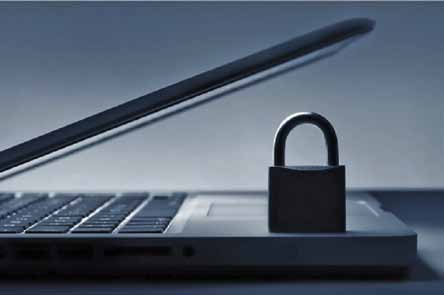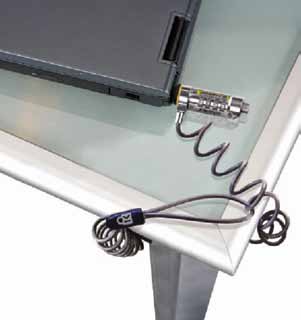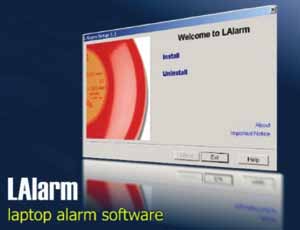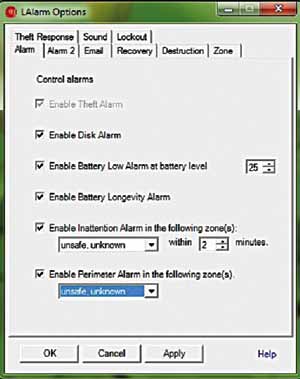
Just having your laptop locked up in a laptop bag is not enough to deter thieves. You need to have certain measures in place to prevent the laptop from getting stolen, and also to ensure that the sensitive data stored on it does not go into the wrong hands.
You can secure your laptop both physically as well as digitally (through software). Here we’ll talk about mainly the software-based security.
Physical security
Physical security devices deter theft of your expensive laptop hardware. A simple solution is a cable with a wrap-around loop at one end for tethering, and a lock at the other end that goes directly inside the laptop’s security slot. When the lock is in place, it is nearly impossible to remove the laptop without causing signifiant physical damage to it. So when using the laptop in a public place, you can secure the laptop by attaching it with a security cable to something immovable or to a heavy piece of furniture that can’t be moved easily. A typical security lock with a cable is shown in Fig. 1.
Software-based laptop security
Like most security measures, cables for the laptop’s physical ecurity are not infallible. Another effective method is to use an anti-theft protection software. Plenty of feature-packed software tools are widely available for laptop security, but their high cost prevents laptop users from using them. Fortunately, there are a number of free software too which come handy for the purpose. One such software is LAlarm, which sounds an alarm when your laptop is in the danger of getting stolen or losing data. It can recover as well as destroy the data on the laptop if the laptop is stolen.

LAlarm verison 5.7 (refer Fig. 2) is available for Windows operating system (OS)-based portable computers. The software is free for personal use and can be downloaded from www.lalarm.com/en/Download.htm site. If you encounter any problem in using this software, visit the LAlarm homepage at www.lalarm.com website or contact LAlarm Systems Support by sending an e-mail to [email protected].
LAlarm is a comprehensive laptop security application that contains a series of tools to help laptop users. It consists of seven alarms and several other security features designed to secure a laptop. The anti-theft alert can be enabled through the laptop’s power adaptor or a USB flash drive connecte to its USB port. The alarm triggers in the laptop when its power adaptor is disconnected from the power outlet or the USB flashdrive is removed from the laptop.


LAlarm software also deletes sensitive data on the laptop through various settings to ensure that the data remains confidential if the laptop is stolen. There is a setting option to recover the data before permanently destroying it. Further, the software helps to prevent data loss or data corruption due to a sudden turn-off of the computer and/or physical and logical hard disk errors at an early stage.
LAlarm operation
Download LAlarm software from the Internet and install it on your laptop. After installation, LAlarm is automatically enabled and some alarm features are activated by default when the system is rebooted. The software works in the background of Windows applications.
[stextbox id=”info” caption=”LAlarm features”]Prevents laptop theft. Produces loud audio alert in case of laptop theft. Can also sound an alarm if the laptop is left unattended for a long time.
Protects sensitive data. Permanently destroys data if the laptop is stolen.
Keeps it within a perimeter. Sounds an alarm when the laptop leaves a certain area. Helps prevent laptop misuse and provides more security.
Prolongs battery life. Preserves battery capacity. Alerts when the battery is low or under stress.
Prevents data corruption. Alerts when sudden power loss is imminent. Allows to save files quickly and shutdown before power loss corrupts data.
Prevents data loss. Alerts of physical and logical hard disk errors. Alerts at an early stage to allow repairs before data loss.
Prevents laptop failure. Detects deterioration of the hard disk drive.[/stextbox]
LAlarm consists of five main alarms—theft alarm, perimeter alarm, inattention alarm, disk alarm and battery longevity alarm (refer Fig. 3). The theft and battery longevity alarms are already enabled. However, the alarms can be individually enabled or disabled from the ‘Options’ setting. The details of various alarms and their settings are given in ‘Help’ menu of the software. Note that some of the alarm features do not work in XP and lower versions of Windows OS.
Theft alarm and theft response feature are detailed below.







